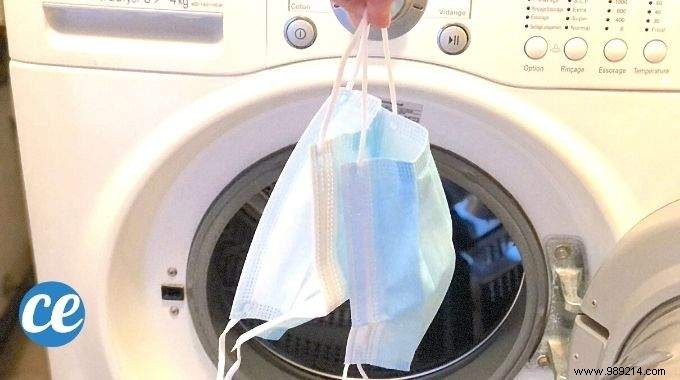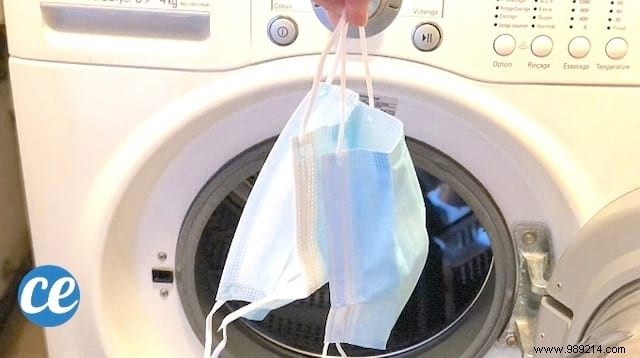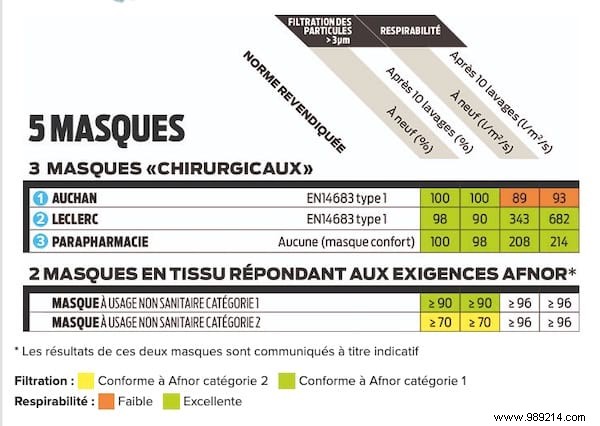
Can disposable surgical masks be washed?
You know, those single-use masks to prevent the spread of COVID...
Can they ultimately be used several times without risk?
Because we all thought at first that we should throw them away after each use...
Result, hello tons of waste in the bins!
Fortunately, Que Choisir magazine did some tests to see what these masks really were.
To answer this, the experts carried out tests on 3 models of surgical masks purchased in supermarkets and drugstores.
Wondering if you can reuse your disposable surgical mask? The answer will surely surprise you:

The answer is clear.
Surgical masks retain good filtration capabilities, even after being washed 10 times.
In addition, wearing these masks remains comfortable.
Users' breathing is not hampered.
The magazine believes that the masks can be worn for several hours without being uncomfortable.
UFC-Que Choisir goes even further.
It compares the effectiveness of surgical masks washed several times with that of fabric masks also washed several times.
The conclusion?
For them, surgical masks remain more effective to filter the air you breathe than fabric masks.
Thus, even after several washes, the protection of surgical masks remains superior to that of fabric masks.
According to these tests, you can wash and reuse your disposable masks 10 times .
The experts at Que Choisir have carried out 10 machine washes at 60°C.
They were then tumble dried.
Then they were ironed at a very low temperature (the iron's lowest setting).

For L'UFC-Que Choisir, there is no doubt.
The filtration of the masks once washed remains largely sufficient for general public use.
The filtering capacity is 100% for one of the surgical masks, 90% for the other.
The third so-called comfort mask obtains 98% filtration capacity.
The rubber bands are still in place. And they are not damaged.
Only problem, the texture of the masks is slightly different. It is more felted than if the mask was new.
Washed surgical fabric masks therefore obtain identical performance to fabric masks bearing the Afnor/DGA guarantee.
Thus, according to Que Choisir, reuse of surgical masks is possible.
And always guaranteeing a good level of protection.
And that's good news for the planet... and our wallet.
Indeed, surgical masks remain cheaper per unit than a fabric mask.
But that's not all.
They are also a real ecological disaster since they are made of plastic that cannot be recycled.
By reusing them, we limit waste and save money.
But as soon as the mask is a little damaged, it must of course be thrown away.
On the side of the General Directorate of Health (DGS), it's a different story that we hear.
She recalls that "according to the recommendations of the High Council for Public Health, single-use surgical masks must be thrown in a trash can after use", according to Le Figaro.
That said, remember that in the summer of 2020, experts felt that it was very complicated to disinfect a surgical mask satisfactorily.
To discover: Coronavirus:Can We Reuse a Surgical Mask?

Source: What to Choose
The Que Choisir experts have chosen two surgical masks with the EN 14683 standard, type 1.
According to this standard, they must ensure 95% bacteria filtration efficiency.
These two masks were bought in supermarkets.
The third mask was purchased from a parapharmacy. It appears as a comfort mask, without official branding.
New, these 3 masks are capable of stopping 98% of particles larger than 3 µm.
The cloth masks used for comparison stop 90% of particles larger than 3 µm. These fabric masks all have the Afnor/DGA guarantee.